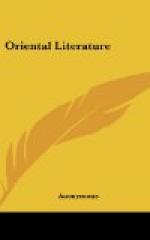In spite of the indisputable virtues of Antar, in spite of the great services he had rendered the Absians, the chieftains of this tribe still regarded him as merely a common slave and tender of cattle. The beginning of his rise to favor excited a feeling of keen hatred, and caused many plots to be laid against him. A series of intrigues was entered upon, the aim of which was the death of the hero. But each attack upon his reputation and his life redounded to his benefit, and furnished him with an opportunity of putting his enemies to silence and defeat. For by his generosity and magnanimity, even his envious foes felt themselves under obligation to him. On each of his triumphs the mutual love between himself and Ibla went on increasing.
After the performance of many feats as a horseman, Antar came into possession of a famous horse named Abjer, and a sword of marvellous temper, Djamy—and every time he appeared on the field of combat, as well as when he returned victorious from the fight, he made a poetic address, finishing with the words, “I am the lover of Ibla.” At the conclusion of a war in which he had performed prodigies of valor, King Zoheir gave him the surname of Alboufauris, which means, “The Father of Horsemen.”
The greater grew his name, the more highly he was honored by King Zoheir, so much the more did the hatred of the chieftains and the love of Ibla towards him increase. But it came to pass that Ibla was asked in marriage by Amarah, a stupid youth, puffed up by his wealth and lineage. Antar, on hearing the news, was transported with rage, and attacked his young rival with such violence that all the Arabian chiefs begged of Zoheir to punish the aggressor. The king left to Shedad, Antar’s father, the pronouncing of sentence. Shedad had, like the others, viewed the rise of Antar, the black slave, to favor, with jealous eye, and sent him back to the pastures to keep the herds.
It was at this point that the greatness of Antar’s character appeared in its full dimensions. The hero submitted with resignation to the orders of his father, “to whom,” he said, “he owed obedience as to his master, since he was his slave”; and he swore to him, in the presence of witnesses, not to mount horse, nor engage in battle, without his permission. Tears flowed from his eyes, and before departing for the pastures he went to see his mother Zebiba, and to talk with her concerning Ibla. “Ibla?” said his mother—“but a moment ago she was here beside me, and said to me, ’Comfort the heart of Antar, and tell him from me, that even should my father torture me to death in trying to change my mind, I would not desire nor ask for other husband than Antar.’”
These words of Ibla filled with rapture the heart of Antar, as he started for the pastures in company with his brothers, Djaris and Shidoub.




